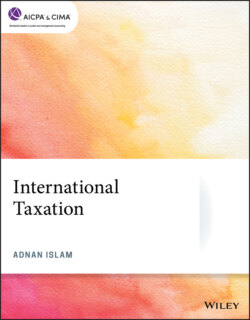Читать книгу International Taxation - Adnan Islam - Страница 62
Election to use the dollar as functional currency of a qualified QBU
ОглавлениеA QBU with a functional currency other than the U.S. dollar may elect to use the dollar as its functional currency subject to regulatory guidelines. The regulations state that only eligible QBU’s are permitted to make this election. An eligible QBU means a QBU whose functional currency is (without an election) a hyperinflationary currency (Treasury Regulation 1.985-2(b)(1)). A hyperinflationary currency is the currency of a country in which the cumulative inflation during a base period is at least 100%, as determined by reference to the consumer price index of the country in the monthly issues of International Financial Statistics or a successor publication of the International Monetary Fund. If a country is not listed in the International Financial Statistics, a QBU may use any other reasonable method consistently applied for determining the country’s consumer price index. The base period for any taxable year is the 36 months immediately preceding the last day of the preceding taxable year.
A U.S. person electing to use the dollar as the functional currency for a QBU that is a branch must file Form 8819, “Dollar Election under Section 985,” with that person’s timely filed federal income tax return (including extensions) for the tax year the election is effective.
The election to use the dollar as the functional currency for other eligible QBUs (partnership, trust, or estate, CFC, branch of a CFC, or a non-CFC or branch of a non-controlled foreign corporation) is made by filing Form 8819 within 180 days after the end of the tax year for which the dollar election is effective. Prior to filing Form 8819, the controlling U.S. shareholders (or the foreign corporation, if the dollar election is made by the corporation) must provide written notice that the dollar election will be made to all U.S. persons known to be shareholders of the foreign corporation.
Form 8819 requires that the following information be provided: the name, address, and identification number of the person making the election and the tax year for which the dollar election is effective, the entity for which the election is made, including name, address, identifying number and ownership interest, the names, addresses, and identifying numbers of all persons related to the electing QBU and who are eligible QBUs or who have a branch that is an eligible QBU.
If the election is made by or for a foreign corporation the following information must be provided: the name of the foreign corporation, the country of organization or creation, and the principal place of business for each eligible QBU. In addition, foreign corporations making the election must provide the name, address, and identifying number of every U.S. person notified of the dollar election and the country where the principal place of business of the eligible QBU is located.
If an eligible QBU is a non-CFC or a branch of a non-CFC, the dollar election must be made on Form 8819 by the corporation or the majority domestic corporate shareholders on behalf of the corporation. The same rules apply for the QBUs that apply for CFCs or branches of CFCs, except that “controlling U.S. shareholders” is used instead of “majority domestic corporate shareholders.” The term majority domestic corporate shareholders means those domestic corporate shareholders who in the aggregate own greater than 50% of the total combined voting power of all classes of stock of the non-CFC entitled to vote that is owned by all the domestic corporate shareholders (Treasury Regulation 1.985-2(c)(3)).
